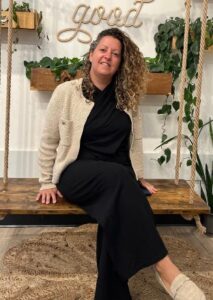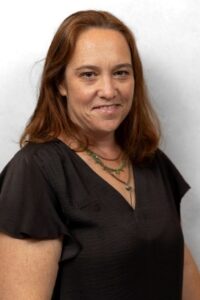By Andrew Adler
Community Editor
This past Nov. 22, four Israeli women – two Jewish and two Muslim — spoke to staff members at the Jewish Federation of Louisville and the Trager Family JCC. They were the latest delegation from Women Leading a Dialogue – a group of Jewish, Muslim, Christian and Druze women living in Northern Israel’s Western Galilee region, powerful exemplars of interfaith cooperation amid a nation where such cooperation too often is in short supply.
They were visiting Louisville to speak to broad array of audiences, including congregants at The Temple, Keneseth Israel and Temple Shalom, and students at DuPont Manual High School.
Below are excerpts from remarks by the four participants: Maor Levy-Ratz, Shahazad Bargout Swidan, Karin Nathans Gefen and Safinaz Beromi. Also present was Noah Epstein Friedman, who coordinates the initiative as part of Partnership2Gether’s ongoing programs in Israel’s Western Galilee.
Maor Levy-Ratz
In 2020 we had the opportunity to join the third program of Women Leading a Dialogue. It was an opportunity for me to know my neighbors who I lived with, but I didn’t know their religions or their way of living. We became good friends, and in 2022 came to the states for the first time as a delegation from five different Jewish communities. It’s an amazing group I’m part of – this is my family.
I have three kids: 14, 13 and 12 – two daughters and a boy, and my husband. My kids were born there at Kibbutz Eilon, which is 1.3 miles from the border with Lebanon. The North used to be one of the most amazing places in Israel for me. I have a flower shop on the kibbutz, but it’s been dark because of the war – closed since October 7 – because we were evacuated from the kibbutz.
On October 8 at 8:30 in the morning, we got a message from the municipality that we had to leave our house – each of us took a backpack, our dog, and we left. We lived for three weeks with our family in the center of Israel. Then we moved to a hotel in the Negev, and we lived there for eight and a half months in (one) bedroom. We established a K-12 school for the kids in the (nearby) kibbutz. It was hard, but we had a beautiful community there.” Soon afterward, “a family from the States invited us to come here. It was hard to decide that we’d be leaving Israel, our family, friends and community, but we decided it’d be a good opportunity for our kids.”
While we were at the hotel, we saw delegations (who’d been evacuated from Southern Israel), and no one knew what had really happened in the North. So, we started to give lectures here in the States, and also in Europe. I’m so happy to be part of this amazing group. The first phone call when we left our house on October 8 was to these women – that’s how close we are.”
Shahrazad Bargout Swidan
I’m from the Arab-El-Aramshe, an Arab village about 200 yards from the (Lebanese) border, with about 1,800 people. In the Western Galilee lives a very diverse population that includes Jews, Arabs, Muslims, Druze and Christians – symbolized by a shared life and coexistence. The aim is to bring different populations together through educational, cultural and community activities.
Since October 7, our life has turned upside down. We received a message from the authorities about evacuating the village for a week. So we packed our stuff in a backpack and drove south to Akko, where I was born and raised. Then they said it would be for two weeks, but it was getting longer, so we decided to move to an evacuation center hotel. We build a new community in the hotel, which had Arabs and Jews together, but it was very difficult to in one bedroom with teenagers, so decided to rent an apartment,” until this past June, when a larger apartment the family had bought as an investment property became available. “Little by little we learned the paths of life in the city.”
“The war has taken a heavy toll on my family. My son is an officer in the IDF and has been on the front lines fighting for the security of Israel.
Karin Nathans Gefen
I was born and raised at Kibbutz Matzuva,” like Kibbutz Eilon, “1.3 miles from the border with Lebanon. We loved to have guests all day, all the time – on the Sixth of October we sat and drank wine and had plans for the next few days. We didn’t know that after the Seventh of October our lives would change. I was part of the team that told all the residents of the kibbutz they’d have to leave, as soon as they could, to go further south. It was something like 1,300 people. We called everyone and said, ‘Take a backpack for two or three days.’ Then I was in Tiberias (located on the western shore of the Sea of Galilee), also in a hotel. (Today) we live in a small apartment without a shelter, so we have to run to another shelter when the sirens go off.
It’s important for me to be a part of this group, because this is who we are – to learn and to know my neighbors much better than I knew before.
Safinaz Beromi
I’m a Muslim who grew up in the city of Akko, a lawyer by profession. For the past 11 years I’ve worked in the Ministry of Finance in Israel. The journey I have travelled has been really, really hard, with many bumps and hardships along the way, as well as successes. It’s these experiences that have shaped me into the woman I am today.
I believe in the pursuing of justice. I joined this delegation because I believe that powerful women with vision can change the world. This is my second time participating in this incredible group, but this time the circumstances are different. I approached this mission with mixed emotions after October 7 – a few days afterward, me and my family fled abroad to Turkey. October 7 disturbed the bridge of coexistence that had been built between Arabs and Jews. The new reality presents us, unfortunately, with increased racism, extremism, and violation of freedom of expression. It’s so sensitive to share anything – for example, from the Quran, or just how I feel today. It’s painful to witness the damage on both sides.
It’s disappointing to feel threatened, especially when speaking my native language, Arabic, or when I’m on the train or in the gym and I can see my coach has his gun on his side. My greatest fear is the potential loss of the coexistence and shared life we once had, and the possibility of raising a new generation filled with hatred and division.
Yet even in the face of such obstacles, she’s driven “by a strong desire to highlight the mixed cultures of the Western Galilee,” believing that the differences between cultures can be embraced, even when they are vast and complex. I believe that change can begin within us and our awareness of our attitudes and environment. I have faith that women have the power to change the world, and I have the hope that this change can begin within our group.








